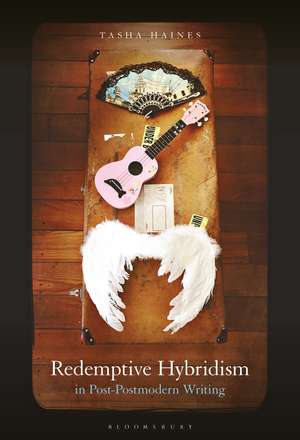Redemptive Hybridism in Post-Postmodern Writing
Autor Dr. Tasha Hainesen Limba Engleză Hardback – 13 dec 2023
Preț: 465.96 lei
Preț vechi: 645.41 lei
-28% Nou
Puncte Express: 699
Preț estimativ în valută:
89.17€ • 92.57$ • 74.35£
89.17€ • 92.57$ • 74.35£
Carte tipărită la comandă
Livrare economică 25 martie-08 aprilie
Preluare comenzi: 021 569.72.76
Specificații
ISBN-13: 9781501394508
ISBN-10: 1501394509
Pagini: 168
Dimensiuni: 152 x 229 x 25 mm
Greutate: 0.41 kg
Editura: Bloomsbury Publishing
Colecția Bloomsbury Academic
Locul publicării:New York, United States
ISBN-10: 1501394509
Pagini: 168
Dimensiuni: 152 x 229 x 25 mm
Greutate: 0.41 kg
Editura: Bloomsbury Publishing
Colecția Bloomsbury Academic
Locul publicării:New York, United States
Caracteristici
Offers a useful contribution to the areas of modernist and postmodernist studies, articulating previously unheard connections across the writers of the 'modernist continuum'
Notă biografică
Tasha Haines is a writer and maker of hybrid forms, based in New Zealand. She has a background in mixed-media arts practice and teaching, with a PhD in literary theory and creative writing.
Cuprins
PrefaceIntroduction: The Enemy WithinTaking Enemies InThis Multivariant PlotThe Vitality of DifferenceA Lineage of Wariness and InfluenceThe Terrible Postmodern PartyPart I: Features of Redemptive Hybridism1. The Redemptive Textual BodyEtymologiesUmbilical Connection, Author to TextThe Word Made Flesh2. The Hybrid MiddlePushing out towards EndsSarraute as MiddleParataxis and the MiddleTime and Unfinishedness3. Family Traits of FragmentationThe Fragmented MindConstraint, Minimalism, and the CaveatVestibule and FringeEthics, Alterity, and the ReaderThe Ethical, The Moral, and the DifferenceHigh, Low, High Low, It's Off to Blend We GoPart II: Figures of Redemptive Hybridism4. Woolf's Atom; The Image of HybridityBegin with the Atom, Virginia WoolfSaturation in Woolf and WallaceMrs. Dalloway as Fertile GroundInter-genre WoolfIt Ends Where It Begins, with the Atom5. Finding a Name for PossibilityPostmodernism, Feminism, and AgencyFinding Names and Building FramesCall Me[a]taxy: Some Recent Pre-fixes6. The Pale King's Constellation; Factoids, Ghosts, and BoredomTell the Truth, David Foster WallaceEveryday Ghosts, Souls, & PhantomsAmbiguity & Contradiction in The Pale KingBoredom: Between Crisis & EpiphanyA Conclusion, of Sorts; This Is Not the EndReferencesIndex
Recenzii
With humility, skill, and ingenuity, Tasha Haines co-mingles philosophy, theory, and artistic autobiography to approach some of the most complex texts in the modernisms continuum. In Redemptive Hybridism, the hybrid, creative theories of Deleuze and Guattari, Hassan, Lyotard, Eagleton, Bakhtin, and others, flow through Virginia Woolf's atomic saturation, David Foster Wallace's unfinishedness, and Maggie Nelson's fragments. Haines' marriage of form and content is unusually lucid. It is a rare delight to accept Haines' invitation "to engage spaces of possibility in recognition of the fact that nothing ever really dies it simply crosses over, hybridly, redemptively.
A playful, probing text that not only forges new pathways for considering two major figures of the 20th century, but also provocatively invites the reader to reflect on their own role in the process. Reversing and disrupting received wisdom, Haines assembles a ludic and agile critical apparatus that is both critically rigorous and enormously enjoyable to read.
'To be "post" is to hold onto the past while transforming it,' Tasha Haines writes in her introduction. Firmly situating this study in the 21st century, hybridization emerges as a recuperative, exploratory act. Only with the un-mooring that comes with such risk, Haines argues, is real discovery-a re-envisioning of the terrain artists and theorists have covered and recovered-possible.
A discursively daring exploration of the conditions of redemption, sincerity, and literary camaraderie as located both in texts and at the seat of reader engagement.
A playful, probing text that not only forges new pathways for considering two major figures of the 20th century, but also provocatively invites the reader to reflect on their own role in the process. Reversing and disrupting received wisdom, Haines assembles a ludic and agile critical apparatus that is both critically rigorous and enormously enjoyable to read.
'To be "post" is to hold onto the past while transforming it,' Tasha Haines writes in her introduction. Firmly situating this study in the 21st century, hybridization emerges as a recuperative, exploratory act. Only with the un-mooring that comes with such risk, Haines argues, is real discovery-a re-envisioning of the terrain artists and theorists have covered and recovered-possible.
A discursively daring exploration of the conditions of redemption, sincerity, and literary camaraderie as located both in texts and at the seat of reader engagement.
